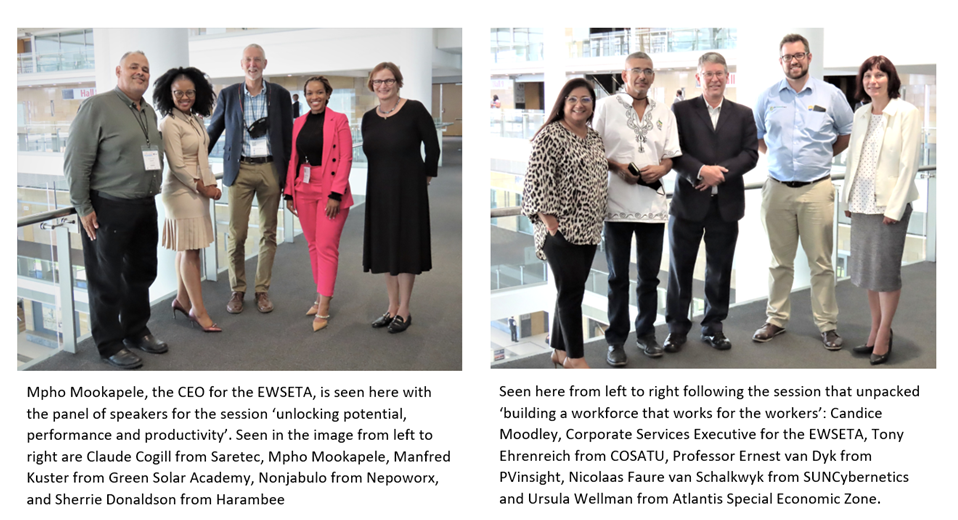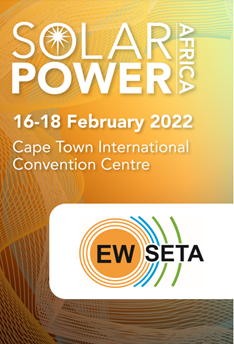Skills Development a Key Driver for SA’s Solar Future.

Skills Development Highlighted as a Key Driver for South Africa’s Solar Future
The programme for the inaugural Solar Power Africa conference and exhibition held from 16 – 18 2022 at Cape Town International Conference Centre reflected the emphasis being placed on skills development in South Africa’s renewable energy (RE) sector.
The Energy and Water Sector Education and Training Authority (EWSETA) takes its role as the skills development authority in the sector seriously and participated in two breakaway sessions that focused on the importance of skills development in the successful deployment of solar power in the country.
“To successfully achieve sustainable skills growth in the solar sub-sector and the renewable energy sector at large, that is aligned to the needs of the sector, requires collaboration and intentional effort by all relevant stakeholders in close collaboration with the EWSETA,” states Mpho Mookapele, Chief Executive Officer for the EWSETA.
On Day 1 of the event, Mpho Mookapele, joined a panel of industry experts to weigh in on the topic: ‘unlocking potential, performance and productivity’ that sought to focus on the role that proactive skills development and training will play in fully realising South Africa’s solar potential. In this session, panellists provided valuable input on how the sector can upskill, retrain and engage the country’s labour force to maximise participation in this dynamic sector.
A key theme that emerged during the discussion was the need for the sector to identify and implement training that meets the needs of the sector, as opposed to training for the sake of training. Industry-led planning and implementation will be necessary if we are to ensure that learners find themselves in gainful employment as opposed to the sector continuing the import of skills required.
“Year-on-year, the EWSETA urges its levy-paying employers to submit Workplace Skills Plans (WSPs) and Annual Training Reports (ATRs) as the information gleaned from these submissions serves to guide sector skills planning,” adds Mookapele. “Yet, we are still not seeing the ‘real’ and ‘anticipated future’ needs of the sector reflected in these annual submissions and this is one of the factors that has contributed to training that is irrelevant or misaligned to industry requirements.
Candice Moodley, EWSETA’s Corporate Services Executive, joined the skills development breakaway session on day 2 of the event where the theme was ‘building a workforce that works for the workers’. In this session, focus was placed on priorities that need to be addressed that will ensure the ‘just energy transition’ is indeed ‘just’ for current and future workers in the energy sector.
A key message in Moodley’s presentation was the role that public institutions of learning such as TVET colleges, need to play in the skilling and reskilling of the energy sector labour force. To leave these institutions behind, whilst the sector moves ahead at a rapid pace due to technological advancements, is counter-productive given the rage and quantity of technical skills that will be sought from these institutions.
“It is clear that if TVET Colleges and other public institutions are not supported and capacitated in parallel to the Just Energy Transition, localisation of skills will not be realised,” emphasises Moodley.
Moodley went on to articulate the EWSETA’s skills development approach to ensure that the ultimate impact of inclusive economic growth is achieved, through the implementation of focussed interventions for the current workforce, women and youth, SMME’s, civil society and communities that stand to lose and gain in the transition across the energy value chain.
“As clean energy deployment gains momentum in South Africa, it is vital that we put in place the building blocks now for a diverse and equitable workforce. We need a plan that will allow us to seize the moment and build the necessary solar workforce, whilst at the same time ensure workforce development policy, labour standards, and training programmes are inclusive and address equity considerations,” concludes Moodley.

